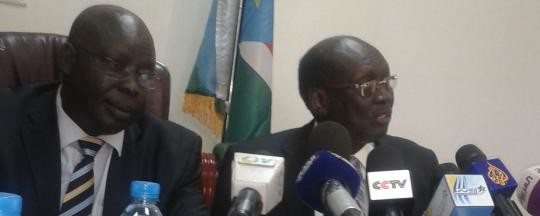South Sudan’s ruling party SPLM-Juba continues to push humanitarian groups in South Sudan to nationalize their staff, despite rescinding a controversial ban on foreign workers earlier this year.
The warring party controls the presidency, several governorships as well as the national ministries in Juba including the labor ministry.
In September, the Ministry of Labor ordered a ban on foreign workers, though quickly backed down after widespread outcry from both regional business leaders and international aid groups.
At the time, aid groups pointed out that an expulsion of foreign workers would severely restrict South Sudan’s capacity to address the massive humanitarian crisis caused by the inter-SPLM conflict.
But according to interviews and documents seen by Radio Tamazuj, officials loyal to SPLM-Juba at national and state labor ministries continue to push behind the scenes for nationalization of humanitarian operations.
In one case, the Ministry of Labor demanded that seven positions of one aid group be filled by national staff – after foreign workers had already been selected.
“We see no tangible reason as to why foreigners are being prioritized for placements,” read a letter from National Ministry of Labor undersecretary Nyengwi Livio Fulli to the aid group’s country director.
Fulli then demanded that future vacancies related to the organization’s finances “be advertised and filled by competent nationals.”
“During a time when human resources are already scarce and most NGOs are struggling immensely to find quality staff – both national and international – these kind of restrictions can mean that important posts are left vacant, which has an impact on operations,” said an aid official not working for the agency targeted in the letter.
National and state ministries of labor have also used the nationalization issue to increase bureaucracy, slowing down the delivery of aid to civilians in need.
The Director General of the Jonglei State Ministry of Labor, for instance, recently demanded a host of documents related to one agency’s foreign staff.
The documents had already been presented to the national government, in effect doubling the amount of effort a humanitarian agency would have to do for their staff to begin work.
“It takes a considerable amount of time and money to address each of these small things, the cumulative impact of which detracts from the time [and] money NGOs are spending on the humanitarian response,” said the aid official, who also does not work for the agency in Jonglei.
The official added that foreign humanitarian workers have been intimidated in meetings with questions about their immigration status.
File photo: Labour Minister Ngor Kolong (left)
This article is part of an exclusive Radio Tamazuj series documenting harassment and violence against aid workers in South Sudan. If you have information on harassment of humanitarians or restrictions on aid, please contact Radio Tamazuj here.
Related:
SPLA-Juba imposes new restrictions on humanitarian flights (4 Dec.)
SPLM-Juba accuses humanitarians of ‘stealing’ donated aid money (4 Dec.)




